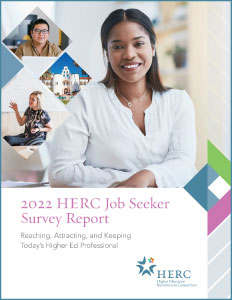Today’s Diverse Higher Ed Job Seekers Value Healthy Workplace Culture, DEI Policies; Open to Careers in Other Industries
SAN FRANCISCO, CA – As employers continue to grapple with the “Great Resignation,” they are faced with filling job vacancies and addressing quickly evolving employee needs. A new report from the Higher Education Recruitment Consortium (HERC) sheds light on today’s higher education job seekers. [The full report is available to HERC members. If you are media interested in accessing the report, please contact Marcia Silva – see info at the bottom.]
The new publication, “2022 HERC Job Seeker Survey Report: Reaching, Attracting, and Keeping Today’s Higher Ed Professional,” shares key takeaways and recommendations for HR, academic affairs, and diversity leaders in developing inclusive and equitable recruitment and retention policies.
“In a job seeker’s market, it’s essential for higher education institutions to understand today’s job seekers so they can evolve their programs and policies to support an inclusive workplace,” said Jessica Wise, HERC Training and Development Director. “This report provides timely information on what job seekers need and value, such as a healthy workplace culture and acceptance of diverse backgrounds and ideas.”
The report delves into how to grow the job candidate pool, appeal to job seekers, and retain employees. Some of the trends identified in our report from last year remain, such as job seekers finding remote jobs attractive, but new data has emerged that could help reshape how higher education institutions conduct their recruitment activities and communicate their offerings right away.
Some highlighted report findings include:
- Of the 85% of survey respondents that noted they were actively or passively job searching, more than half were not exclusively seeking opportunities in higher education. Another revealing datapoint is that half of all survey respondents reported that they have not worked or are not currently working in higher education.
- While 74% of survey respondents would “definitely” or “probably” choose a remote job over in-person, there’s also a strong willingness to relocate for the right opportunity across all age groups: 18-37-year-olds are the most likely to say yes to relocating (46%), followed by 38-53-year-olds (42%) then 54+-year-olds (37%).
- When asked to rate various career aspects and employee benefits, a healthy workplace culture and supportive leadership were top-rated by both minority & underrepresented and white respondents. However, “acceptance of my background” was rated third for minority and underrepresented job seekers, while “work-life satisfaction” was third for white respondents.
- The majority of respondents (81%) noted that diversity and inclusion policies were important to them. Concrete evidence of salary equity (78%), inclusive workplace culture (72%), and a positive reputation from employees (71%) were rated by respondents as the most important indicators of an employer’s commitment to diversity and inclusion.
“HERC members know that educating people of all backgrounds, beliefs, and cultures takes a diverse academic workforce,” said Ruth Molina, HERC Governance Board Chair. “Our members value our direct job seeker engagement, which gives us access to a wide range of perspectives from prospective and current higher education professionals.”
ABOUT THE HIGHER EDUCATION RECRUITMENT CONSORTIUM: The Higher Education Recruitment Consortium (HERC) is a nonprofit consortium committed to advancing diversity, equity, and inclusion in the higher education workforce. With over 700 colleges, universities, hospitals, research labs, government agencies, and related organizations, HERC works to ensure member institutions are sites of belonging, where all faculty and staff can thrive. HERC provides resources, networking, and outreach programs to attract, hire, and retain a diverse and qualified workforce.
CONTACT: Marcia Silva, Higher Education Recruitment Consortium, marcia@hercjobs.org, 650-417-3193

